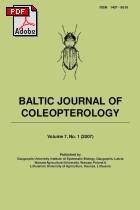Morphological responses to disturbance in wing-polymorphic carabid species (Coleoptera Carabidae) of managed urban grasslands
Main Article Content
Keywords
:
Benign neglect, brachypterous, dispersal, disturbance, Lamarck, lawn, macropterous, semi-natural grasslands, sexual dimorphism, Wing-dimorphic, wing-polymorphic, urban
Abstract
A disturbance gradient comprising three intensities of management of grasslands in urban parks is used to study the responses of carabid beetles to disturbance. The three levels of disturbance are: mown, intermediate and meadow. GLM is used to analyze the response of two morphological traits to disturbance: body size, macroptery and wing length of brachypterous individuals. The proportion of macropterous individuals was greater in the populations of both disturbed and intermediate sites. Also wing-length of brachypterous individuals was longer in the disturbed and intermediate treatments. For body size, there was no change in mean body size for females, though males were larger in the disturbed and intermediate treatments. These males were similarly sized with females, whereas in the undisturbed treatment, there was strong sexual dimorphism for this trait. I conclude that disturbance results in changes that are important for population dynamics. There is a need for further study of species traits that are affected by disturbance, rather than just species assemblage effects.
Article Details
Statistics
Downloads
Download data is not yet available.
Recommend Articles
